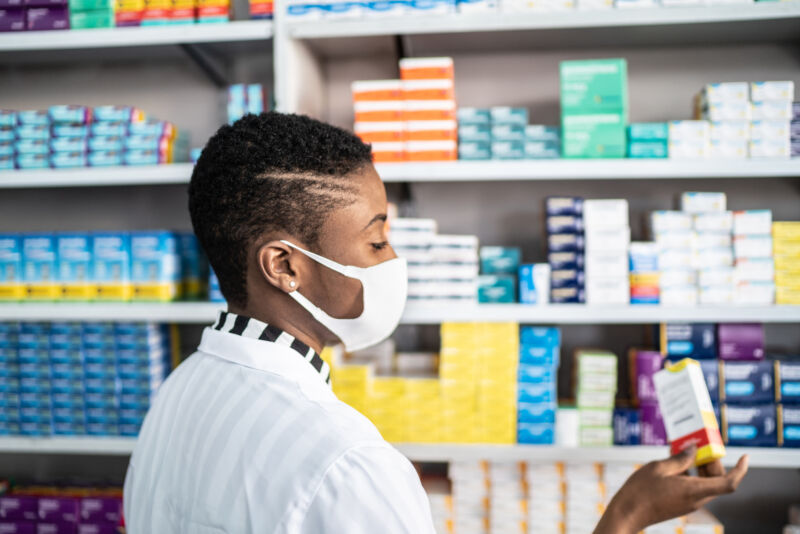
Despite the wide availability of vaccines, the most recent surge in COVID-19 cases left several US states struggling to provide adequate health care to their citizens. The situation reinforces the potential value of drugs like molnupiravir, which reduce the need for hospitalization among those with COVID-19. But monupiravir will be expensive and will likely be difficult to supply globally for some time. So ongoing trials that test existing drugs for effectiveness against COVID-19 can still provide significant value.
One of those trials has just produced some promising results. A cheap generic drug, developed as an antidepressant, appears to reduce hospitalization rates. While the effect was limited, it was clear enough to cause the trial to be cut short.
A decent trial
The drug in question is called fluvoxamine and is part of the class of drugs known as selective serotonin reuptake inhibitors, which are used to treat depression. There is absolutely no reason to expect that fluvoxamine would be effective against SARS-CoV-2, but a small trial tested it anyway, and the study looked promising. So the drug was picked up by a project called the TOGETHER trial, which is running a series of clinical trials using cheap drugs that are already approved for use.
TOGETHER seeks to avoid some of the problems we've seen in smaller trials of similar drugs. It recruits a substantial population and performs randomized, placebo-controlled trials, with both patients and physicians blinded to what the patients are receiving. The project also uses a set of standardized measures for success that are laid out before the trial starts.
In this case, both the treatment and placebo arms of the trial had about 750 participants who were infected with SARS-CoV-2, were experiencing symptoms, and had at least one risk factor for severe disease. The primary outcome that was measured was the need for emergency hospital treatment. Brazil, where the trial took place, has frequently experienced surges of cases that limit access to hospitals, so treatment in emergency care facilities was considered equivalent to hospitalization.
The primary outcome (needing emergency treatment) saw a clear but weak difference between the two groups, with 11 percent in the fluvoxamine group and 16 percent of the placebo group reaching that milestone. This translates into treating 20 people in order to avert one person needing emergency treatment, or a relative risk of 0.73. The treatment group saw a single death, while 12 people died in the placebo group—also a significant difference.
Some cautions
Because of the positive results, a preliminary analysis partway through the trials caused the whole thing to be cut short so the placebo group could be given the drug. Partly due to that, a lot of the secondary outcomes that the trial was tracking didn't reach a statistically significant outcome. Examples include viral clearance, time in the hospital, and number of days on a ventilator. So it's hard to say whether the drug will lead to a general improvement or if some aspects of the patient's health hint at the mechanism of the drug.
The drug wasn't without its problems, though. Eighty-four people who received fluvoxamine stopped using the drug due to side effects, while only 64 receiving the placebo did. (Yes, placebo users get side effects as well.) And as in all clinical trials, some of the participants had problems following the full course of treatment.
This led to a potentially promising finding: The people with the highest levels of compliance with the course of treatment also appeared to do the best in terms of health outcomes. At the same time, they were also notably more likely to experience side effects.
So while the trial was much better than many that have been done on pre-existing drugs, it still leaves plenty of unanswered questions. Fortunately, the results were positive enough that we should probably expect additional trials.
The drug clearly isn't the kind of miracle cure that certain segments of the public have latched on to, given the 1-in-20 figure mentioned above. But if the results hold up, fluvoxamine could play an important role at a societal level by reducing the strain on hospitals caused by surges in cases. Plus, the 10-day course of treatment used here costs only $4. Balanced against those positives, however, are side effects that include mood swings, headaches, and insomnia. Until we get a clearer picture from additional trials, the drug will pose a difficult decision for public health authorities.
The Lancet Global Health, 2021. DOI: 10.1016/S2214-109X(21)00448-4 (About DOIs).
Article From & Read More ( COVID trial using antidepressant cut short due to apparent effectiveness - Ars Technica )https://ift.tt/3CwPDek
Health
Bagikan Berita Ini














0 Response to "COVID trial using antidepressant cut short due to apparent effectiveness - Ars Technica"
Post a Comment